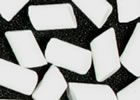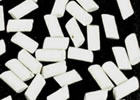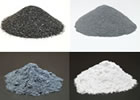Apache Tears Tumbling Rough
Apache Tears Are Composed of Black Obsidian
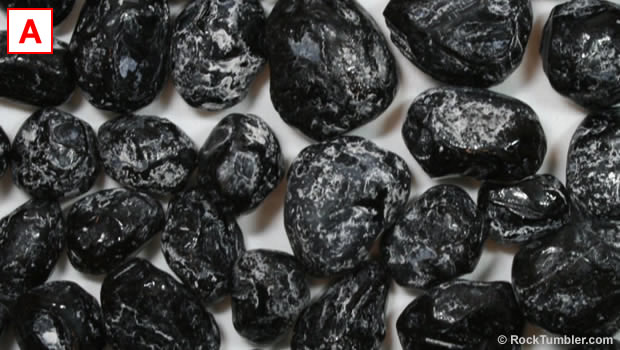
This photo shows some of our Apache Tears tumbling rough. If you are ready for a challenge, give it a try!
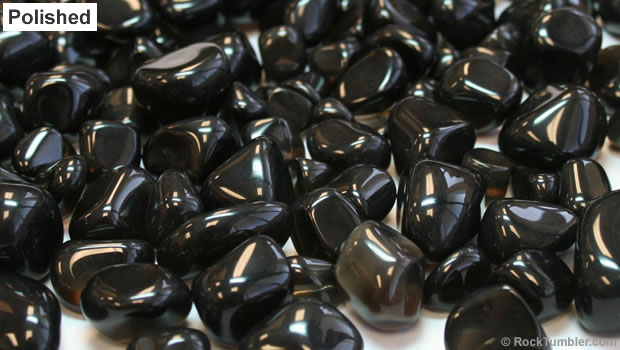
This is a photo of a batch of Apache Tears that we polished. Look at that bright polish and no bruising!
Apache Tears (Black Obsidian)

 ,
,  , and
, and  What do they mean?
What do they mean?
Size: mostly 1/4 to 1 1/2 inch pieces
Apache Tears are small roundish nodules of a black volcanic glass known as "obsidian". They look opaque in the image above, but when polished most of them will be translucent to semi-transparent if you hold them up to the light. They make beautiful jet-black tumbled stones. You can see photos of Apache Tears that we tumbled on this page. We also have polished Apache Tears for sale here.
The rough Apache Tears for sale here range in size from approximately 1/4" (6 mm) to 1 1/2" (38 mm) in diameter. They were mined from deposits in Arizona and Nevada.
Lots of people say that Apache Tears, various types of obsidian, and other natural glasses are a challenge to polish. The problem that they encounter is bruising and chipping if the tears are tossed around too vigorously in a rotary tumbler.
That problem is easy to solve! You simply tumble them gently using plenty of ceramic media to cushion them. Apache tears are also softer than rocks such as jasper and agate, and because of that we skip the coarse grit step and tumble them for a shorter amount of time.
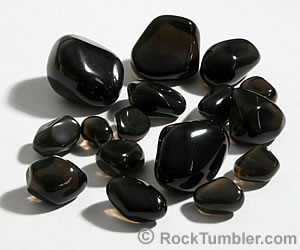
Apache Tears are transparent obsidian. In this photo, you can see colored light in some of their shadows and even see through some of the stones. Only a few varieties of obsidian are transparent.
ADVANCED Rock Tumbling Recipe:
Apache Tears (1/4 to 1 1/2 inches)
These pieces of Apache Tears are about 1/4 to 1 1/2 inches in size and have a Mohs hardness of about 5.5. That is softer than most types of rocks that are processed in a rock tumbler. Obsidian also bruises easily if it is not cushioned. To accommodate these properties, we do three things: 1) skip the coarse grit step; 2) tumble for a shorter amount of time; and 3) tumble them in plenty of ceramic media for cushioning.
1) Skip Coarse Grit: Coarse grit will quickly reduce the size of Apache Tears. So we skip the coarse grit step and begin our tumbling with medium grit (150/220 mesh).
2) Less Time: We also shorten the tumbling time in the first step. Instead of two weeks in medium (150/220) grit, we reduce that to 4 to 6 days. We also reduce the time in fine grit (500 mesh) to 5 days. Polishing time is not changed.
3) Media Needed: Apache Tears bruise easily. To prevent bruising, it should be swimming in a sea of small ceramic cylinder media. We use about 50% ceramic cylinder media and 50% obsidian. The cylindrical shape of the ceramic media pieces will enable them to act like roller bearings and provide a smooth tumbling action in the barrel. The many small pieces of media will also reduce the impact forces that occur in the barrel, and deliver grit to all surfaces of the rough.
Recipe for Rotary Tumbling
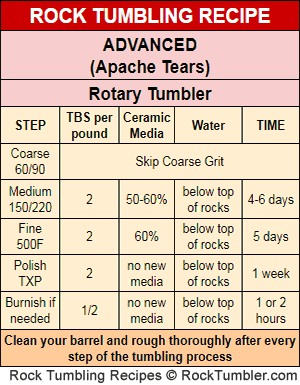
Coarse Grit Step:
Apache Tears are extremely "soft" so you do NOT need to use coarse grit.
Medium Grit Step:
Use two tablespoons medium grit (150/220) per pound of rock and ceramic media. Add enough water to barely cover the rocks. You want 50-60% media and 40-50% Apache tears. Let this tumble for 4-6 days. Rinse, clean and inspect the material. Tumble longer if more smoothing and shaping is desired.
Fine Grit Step:
If more media is needed to maintain barrel capacity, that media should be broken in and not new media with rough edges. Again, two tablespoons of fine grit (500F) per pound of rock and ceramic media. Add water to below the top of the rocks. Tumble for five days.
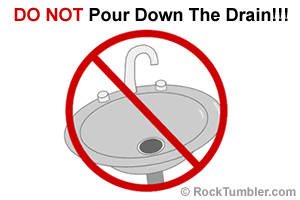
Barrel slurry dumped down the drain will harden like concrete.
IMPORTANT: Make sure that your barrel and rough have been cleaned thoroughly. Any grit carried over from a previous step will likely ruin your polish. Do not add more media at this point.
Measure two tablespoons of TXP Polish per pound of rock and ceramic media. Fill with water to just below the top of the rocks. Tumble for seven days.
Burnish If Needed:
Apache tears usually take a great polish. However, burnishing this material after the polish step can often improve the shininess of the finished stones. If you would like to try burnishing to see if it improves the look of your polished stones, full burnishing instructions can be found here.
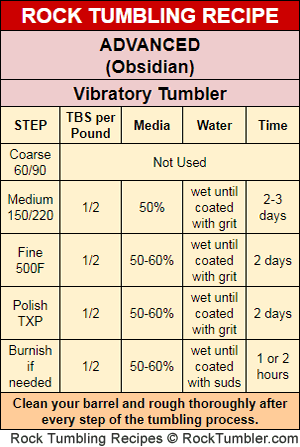
Vibratory Tumbler Recipe:
Coarse Grit (60/90 Mesh):
Coarse grit is not used in a vibrating rock tumbler.
Medium Grit (150/220 Mesh):
Obsidian is a fragile material the can easily be bruised or chipped. It is recommended that you use a minimum of 50% ceramic media. The use of this media will aid in the tumbling action in the barrel and help deliver grit to all surfaces of the rough. Also, the more media, the better the cushioning.
After you have your bowl loaded to the manufacturer's recommended level, add 1 tablespoon of grit for every two pounds of material, including the media, in the bowl. While the tumbler is running, slowly add water until the material has a thin coat of wet grit and the tumbling action is smooth and fast in the bowl.
Check the bowl every 8-12 hours to ensure the action is still good. If the action has slowed, add water a little at a time until the action is back to normal. If the mud gets too thick, you will need to do a complete rinse of the material and bowl. After rinsing, add fresh grit and water and start tumbling again. You are done with medium grit when you are satisfied with the shape and smoothness of the stones. Usually 2-3 days for us with this material. Give the material and bowl a thorough cleaning before moving on to fine grit.
Fine Grit (500F Mesh):
Place your material back in the tumbler bowl, then add enough polished ceramic media to bring the load up to the manufacturer's recommended operating level. This will also get you near the recommended 50% ceramic media. Add one tablespoon of grit for every two pounds of material in the bowl. Then, turn the tumbler on and slowly add water until the material has a thin coat of wet grit and the tumbling action is smooth and fast in the bowl.
Open the bowl every 8-12 hours to check the action is still good. We usually run fine grit for 48 hours. Thoroughly clean the bowl and material before moving to the polishing step.
Polish (#61 Rapid Polish or TXP):
Place the cleaned material back in the bowl. If needed, add ceramic media that has been previously polished, to bring the bowl up to the manufacturer's recommended operating level. Add one tablespoon of polish for every two pounds of material in the bowl. Turn on the tumbler and slowly add water. Stop adding water when the material has a thin coat of wet polish and the tumbling action is smooth and rapid.
Like the previous steps, open the bowl every 8-12 hours to check the tumbling action. Add water if it has slowed. We have found that 48 hours is usually all the time you need to get a good polish.
Burnish If Needed:
This rough will usually take a great polish. However, burnishing this material after the polish step can often improve the look of the finished stones. If you would like to try burnishing to see if it improves the look of your polished stones, full burnishing instructions can be found here.
Finished Apache Tears Tumbled Stones:
If you don't want to tumble these Apache Tears yourself, we usually have medium size (5/8" to 1") tumbled stones of this material for sale. You can find them here.
Customers also bought...
Large Ceramic Media

Small Ceramic Media

Standard Grit Kit



